Yahtzee with Pets
Studies have shown that spending quality time with a pet can greatly benefit a person’s mental well-being. But when throwing a stick or tennis ball gets old, invite the family dog inside for a rousing game of Yahtzee. Animals of all sorts, including goats, birds, bees, and toads have been observed using the same math skills required to play Yahtzee. Learn how to make the right accommodations so that you can enjoy playing Yahtzee with your pet or random animal.
A surfing goat is making waves across California. When Dana McGregor taught his pet goat, Goatee, to surf she instantly became a hit with fellow surfers and tourists alike. McGregor has since incorporated Goatee and her bearded brethren into a wide array of beach adventures including the Beautifully Abled Surf Camp, which teaches the sport to special-needs children. With so many people around the world still isolated at home due to the pandemic, there is an opportunity to expand other favorite pastimes to our four-legged friends in socially-distanced ways. Not surprisingly, Yahtzee with pets is at the top of our list.

LA Times
As a game based on dice, the world’s original random number generator, chance is baked into Yahtzee gameplay. As a result, the game involves a good deal of dumb luck, something that comes naturally to house pets. But success also requires higher mental functioning, such as an ability to strategize and adjust tactics based on changing circumstances. The game’s original marketing slogan from 1956 captured this duality with the tagline, "Yahtzee is an exciting game of skill and chance." But even with a steady supply of luck on their side, can other animals really undertake a complex task like Yahtzee?
Naysayers may contend that it is impossible to teach animals to play Yahtzee since they cannot count, do simple addition, or possess the dexterity needed to roll a cup of dice. But if you're willing to get creative and lend a helping hand when needed, you can most certainly enjoy Yahtzee with your pet. Despite the modern grandeur of electronic handheld Yahtzee, which keeps users locked in single-player isolation, the game is a powerful social stimulant and is best shared with friends - human and otherwise.
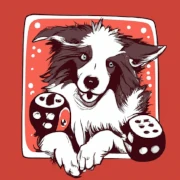
It may be useful when attempting to teach your pet to play Yahtzee to keep in mind that humans are animals. There is a tendency in modern society to think of humans as separate and distinct from other animals and "nature" in general but of course we all evolved together on planet Earth. Blindness to this obvious fact of life is a slippery slope to speciesism, whereas basic Yahtzee principles teach us that no creature is intrinsically superior to another.
The argument against non-human animals in Yahtzee is therefore specious and often devolves into a broader ableist attack. The human species displays a spectacular range of abilities and skill sets across all aspects of life and yet all are able to enjoy Yahtzee. Accommodations that are similar to what differently-abled humans have been using for decades can be modified to help other animals play Yahtzee. Games gate-keeping serves no logical end. Inclusion and diversity on the other hand bring unique viewpoints and experiences to the game, continuing to add to Yahtzee’s rich legacy.
Animal Yahtzee
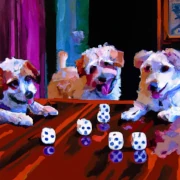
Yahtzee is a complex game that requires a high level of cognitive ability, so it is unlikely that any animal would be able to learn how to play it as well as humans do. However, some animals are known to be more intelligent and trainable than others, which might make them better suited for learning the game.
One animal that has been shown to be highly intelligent and trainable is the domesticated dog. Dogs have been trained to perform a wide range of complex tasks, including playing games, so they might be the best-suited animal to learn how to play Yahtzee.
Dogs possess an impressive combination of cognitive skills that make them ideal Yahtzee partners. With their ability to understand over 200 words, recognize patterns, and even count small numbers, canines have the fundamental building blocks for gameplay. Studies from the Duke University Canine Cognition Center have shown that dogs can understand the concept of "more" and "less," a crucial skill for evaluating Yahtzee combinations.
Other intelligent animals such as dolphins, chimpanzees, and certain species of birds might also have the cognitive ability to learn how to play Yahtzee, but their training would be much more challenging and time-consuming than training a dog.
Training a dog to play Yahtzee would be a challenging task as it requires a lot of cognitive skills such as understanding and remembering rules, recognizing and selecting dice combinations, and communicating with the player.
However, here are some general steps that might help in training a dog to play Yahtzee:
- Teach your dog basic commands: Before you can start training your Yahtzee dog, you need to ensure that they can understand basic commands such as "sit," "stay," and "fetch."
- Introduce the game: Start by introducing the game of Yahtzee to your dog. Show them the dice, explain the rules, and let them watch you play a few rounds.
- Teach the dog to roll the dice: You can start by teaching your dog to roll the dice by giving them a command such as "roll" or "shake." Once they roll the dice, reward them with a treat.
- Teach the dog to recognize and select combinations: Once your dog is comfortable rolling the dice, start teaching them to recognize and select combinations. You can start with simple combinations such as a pair or three of a kind, and gradually move on to more complex combinations.
- Reward the dog for correct selections: Whenever your dog selects the correct combination, reward them with a treat or praise them. This positive reinforcement will encourage them to continue playing and learning.
- Practice regularly: Consistency is key when it comes to training your dog. Practice playing Yahtzee with your dog regularly, and gradually increase the difficulty level as they become more comfortable with the game.
It's important to note that not all dogs are capable of learning to play Yahtzee, as it requires a high level of cognitive ability. However, with patience, practice, and positive reinforcement, your dog might surprise you with their Yahtzee skills!
When adapting Yahtzee for dogs, consider these breed-specific approaches:
- Retrievers and Sporting Dogs: Their natural retrieving instincts make them perfect for a modified game where they fetch specific dice from a scattered arrangement. Use different colored dice and teach commands like "Bring the red one" to incorporate their natural abilities into gameplay.
- Herding Breeds: Border Collies and Australian Shepherds excel at understanding spatial relationships and can be taught to nudge dice into specific patterns. Create a version where they must arrange dice in numerical order or group matching numbers together.
- Terriers and High-Energy Breeds: For these active dogs, incorporate movement between dice rolls. Create "action stations" around the room where they must perform a task before returning to roll again, making Yahtzee an engaging physical and mental exercise.
We’ll Make Great Pets
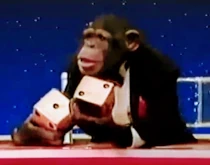
The basic skills required to play Yahtzee are not unique to homo sapiens but are shared amongst thousands of species. Research has proven that a wide variety of non-human animals can count and perform other simple mathematical calculations. Some of the most studied cases include bees, crows, and even oriental fire-bellied toads. Neurobiologist Andreas Nieder has concluded that “numerical competence is present on almost every branch on the animal tree of life.”
An up-close demonstration of animal addition will soon be evident to many North Americans as hordes of cicadas emerge from their underground 17-year slumber. These insects possess the remarkable ability to count the freeze-and-thaw cycles of the changing seasons, while in a hibernation state no less. Why do they adhere to such a specific cycle? Perhaps it is related to the statistical average of a Chance score - also 17.
Both human and non-human individuals possess different skill-sets and levels of ability. But a weakness in one area may prove to be a strength in another. Even so, a player’s skill level need not determine their overall enjoyment of the game. Basic math, for example, is a vital component in Yahtzee but you don’t need to be a scholar to master the game. While it would surely take a very talented non-human to tally the final score on a Yahtzee scorecard, many humans also struggle with addition tasks. Even some top-level players on the Yahtzee Pro Circuit utilize a calculator for assistance, or opt for an auto-adding spreadsheet scorecard.
Likewise, the official Yahtzee rules do not stipulate physically rolling dice from a shaker. Electronic versions have been available almost as long as the original tabletop game and can be enjoyed with a few mouse clicks. A wide variety of other tools can be implemented for differently-abled people and animals, or anyone who wants to experience Yahtzee from a new perspective.
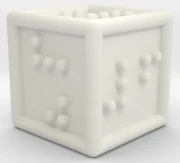
Yahtzee video games, for example, can be especially well-suited to blind or low vision players. Features such as automatic score tally and computer-generated speech to read dice rolls allow the games to flow smoothly. The Yahtzee-adjacent game “Dice World” won the 2019 AppleVis Golden Apple Award as the best game with accessibility features for vision impaired people. And specialized physical game equipment allows gamers to play the traditional way as well. Braille dice or the use of raised pips helps maintain the tactical experience of a game of Yahtzee. These and a myriad of other techniques prove that a physical or mental limitation need play no part is a person’s ability to enjoy Yahtzee.
Higher cognitive skills are a set of advanced cognitive abilities that are often considered unique to humans, such as abstract reasoning, problem-solving, decision-making, and self-awareness. While non-human animals do not possess these skills to the same extent as humans, they do exhibit some level of cognitive complexity in their own ways. Some examples of higher cognitive skills in non-human animals include:
- Tool use and problem-solving: Many species of animals, such as primates and birds, can use tools and solve problems in their natural environment.
- Social intelligence: Many animals, especially primates and some birds, show a high level of social intelligence, exhibiting behaviors such as cooperation, empathy, and social learning.
- Numerical abilities: Some animals, such as primates, birds, and fish, can understand and discriminate between different quantities and perform basic arithmetic operations.
- Memory and learning: Many animals have advanced memory and learning abilities, allowing them to remember complex environments, navigate, and adapt to new situations.
These higher cognitive skills in non-human animals demonstrate the complex and sophisticated nature of animal cognition and their ability to adapt and survive in their environments - and to succeed at the Yahtzee table!
Species-Specific Yahtzee Adaptations
While dogs may be the most common Yahtzee companions, the world of animal Yahtzee extends to a remarkable variety of species. Each type of pet brings unique cognitive abilities and natural behaviors that can be incorporated into specialized versions of the game. From strategic felines to vocal birds, each species offers its own approach to dice-based fun.
Cats: The Strategic Dice Masters
Feline Yahtzee requires acknowledging their independent nature while capitalizing on their natural curiosity and hunting instincts. Cats have demonstrated the ability to count up to four objects and possess exceptional spatial awareness.
Interactive Dice Toys: Create dice that contain treats or catnip inside clear compartments. When the cat bats or moves the dice, they make valid rolls while receiving intermittent rewards.
Tactile Scorecards: Develop scorecards with different textured materials that cats can mark by kneading or scratching approved surfaces.
Timing Considerations: Unlike dogs, cats perform better with shorter, more intense game sessions. Schedule "Yahtzee minutes" throughout the day rather than extended gameplay sessions.
Birds: The Vocal Yahtzee Virtuosos
Parrots and corvids (crows, ravens) demonstrate remarkable numerical abilities, with some species able to count to eight and solve simple arithmetic problems. Their vocal mimicry and manipulation skills make them uniquely suited for specialized Yahtzee variants.
Vocal Yahtzee: Teach birds to vocalize different numbers or combinations. Instead of physically rolling dice, they can "call" their preferred numbers, with owners rolling on their behalf.
Color-Based System: Assign colors to numbers, leveraging birds' excellent color differentiation abilities. They can select colored tokens representing dice values.
Manipulation Games: For larger parrots, provide lightweight dice they can physically manipulate with their beaks and feet, teaching them to place them in designated scoring areas.
Small Mammals: Pocket-Sized Players
Rats, hamsters, guinea pigs, and rabbits each bring different cognitive strengths to Yahtzee gameplay:
Rat Yahtzee: Given their proven ability to count and remember sequences, rats can learn to select numbered tokens in specific orders. Create maze-like setups where they must retrieve dice in numerical sequence.
Rabbit Adaptation: Use their natural digging behavior by creating a game board where they uncover different dice combinations hidden under safe, shallow substrates.
Guinea Pig Version: These social animals respond well to collaborative play. Design a system where different guinea pigs control different aspects of the game – one selects which dice to keep, another triggers re-rolls.
Yahtzee Dog
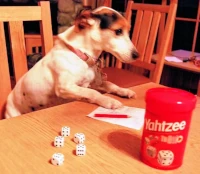
Virginia State Parks
It is clear that people of all ages and abilities and their pets are fully capable of playing Yahtzee. The amusement that it arouses in humans in undeniable but one question remains – just because other animals are able to play Yahtzee, do they really want to?
Human children are undoubtedly the most playful creatures in the world but other animals aren’t far behind. Play has been studied in a vast array of species. Dogs are the most well-known example because of our close relationship with them but the act of playing, especially among youngsters, is a common aspect of animal life. Rats, monkeys, and octopuses have all been observed engaging in play in the wild. The reasons for play, even in humans, is still not fully understood. One popular theory proposes that play helps the young to learn new skills, but the data don’t seem to support this. Really playful kids, after all, aren’t necessarily smarter than their peers. Rather, it appears the people and animals like to play games just because it is fun. Studies have shown that the brains of rats engaged in play receive a boost of mood-regulating chemicals like dopamine. That’s something that can all species can get behind.
Humans can share the joys of Yahtzee with all sorts of animal friends by granting some basic accommodations. One popular method is to play “Hand and Brain” Yahtzee. Inspired by a similar variant in the game of chess, this style consists of a two-player team working in tandem. The non-human player acts as the hand and rolls the dice each turn - or clicks the mouse or whichever type of system is being used to accommodate the animal partner. The human player serves as the brain who makes the tactical decisions of which dice to keep and what Yahtzee strategy to employ.
The Yahtzee variant commonly known as “Yardzee” is another method well-suited to quadrupeds. The game uses standard Yahtzee rules but is played outdoors using giant dice. Dogs and other non-humans are better able to manipulate these over-sized dice and they aren’t choking hazards like regular dice.
Yahtzee enthusiasts should feel free to experiment with an array of different species. The game is, after all, based on a foundation of inclusion and any sentient being will derive satisfaction from scoring a Yahtzee. Online Yahtzee simplifies the physical challenges of the game but even our non-primate animal cousins, with the proper support, can experience the joys of rolling dice. Goats and cicadas are prime candidates for animal Yahtzee fun but it is perhaps best to start with the family dog.


